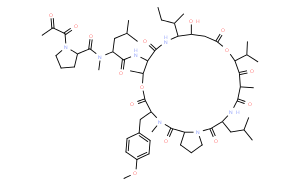| DC72169 |
RP-6685
|
RP-6685 is a potent, selective and orally active DNA polymerase theta (Polθ) inhibitor with an IC50 value of 5.8 nM (PicoGreen assay). RP-6685 shows antitumor efficacy in mouse tumor xenograft model. |
| DC71300 |
Branaplam hydrochloride
|
Branaplam (LMI070; NVS-SM1) hydrochloride is a highly potent, selective and orally active survival motor neuron-2 (SMN2) splicing modulator with an EC50 of 20 nM for SMN. Branaplam hydrochloride inhibits human-ether-a-go-go-related gene (hERG) with an IC50 of 6.3 μM. Branaplam hydrochloride elevates full-length SMN protein and extends survival in a severe spinal muscular atrophy (SMA) mouse model. |
| DC45555 |
SCR130
|
SCR130 is a novel DNA repair inhibitor with IC50s of 14 μM in Reh cells and 2 μM in Nalm6 cells. SCR130 specifically inhibits DNA Ligase IV‐mediated joining with minimal or no effect on Ligase III and Ligase I mediated joining. |
| DC45554 |
Aplidine
|
Aplidine (Plitidepsin) is a potent anti-cancer agent by targeting eEF1A2 ( KD=80 nM). Aplidine possesses antiviral activity and is against SARS-CoV-2 with an IC90 of 0.88 nM. Aplidine is usually used for multiple myeloma and advanced cancer research, and has the potential for COVID-19 research. |
| DC44851 |
CHAPS
|
CHAPS is a zwitterionic surfactant that decreases the sequence specificity of the nucleosome.,nucleosome [1]() |
| DC44137 |
5-Propargylamino-ddUTP
|
5-Propargylamino-ddUTP, a nucleoside molecule that can be used to synthesis of cyanine dye-nucleotide conjugate which is used in nucleic acid labeling or sequence analysis. |
| DC43969 |
NITD-2
|
NITD-2, a dengue virus (DENV) polymerase inhibitor, inhibits the DENV RdRp-mediated RNA elongation. NITD-2 penetrates cell membrane poorly. |
| DC42292 |
DENV-IN-2
|
DENV-IN-2 is a potent dengue viral replication extracted from patent WO2018215315A1, compound 6AB, has an EC50 of 0.016 nM. DENV-IN-2 shows high potent activity against all four serotypes of the Dengue virus with EC50s ranging from 0.013 to 0.029 nM. |
| DC41098 |
Bleomycin hydrochloride
|
Bleomycin hydrochloride is a DNA synthesis inhibitor. Bleomycin hydrochloride is a DNA damaging agent. Bleomycin hydrochloride is an antitumor antibiotic. |
| DC40993 |
Remdesivir O-desphosphate acetonide impurity
|
Remdesivir O-desphosphate acetonide impurity is an impurity of Remdesivir. Remdesivir (GS-5734), a nucleoside analogue with effective antiviral activity and is highly effective in the control of SARS-CoV-2 (COVID-19) infection in vitro. |






















